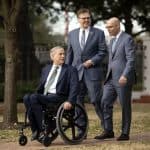Originally posted by Ross Ramsey for The Texas Tribune.
This might seem premature to anyone who has watched the roiling spectacle of a Texas legislative session, but maybe the state’s top leaders are actually working together.
They’ve been saying so for weeks. Everyone paying attention to Capitol conversations has heard the word “kumbaya” too many times. But in spite of the feel-good public relations push, there were differences in the way the governor, the lieutenant governor and the speaker were talking about public education and property taxes.
Greg Abbott, Dan Patrick and Dennis Bonnen were singing from the same hymnal, but it wasn’t clear they were singing from the same page.
They were all talking about school finance, but Bonnen seemed to emphasize more money for schools. Patrick seemed to be talking more about teacher pay than the others. Abbott was talking about rewarding schools where students were doing better.
They were all talking about property tax reform, but there are so many components, it wasn’t clear whether they were synced on limits on growth, appraisal reform, lower or limited tax rates, or which government bodies they were talking about: cities, counties, special districts or schools.
It has all started to clear up a little bit.
The budgeteers in the Texas House opened the bidding on the top issues of the session this week, slapping down a $9 billion increase in public education funding they said is aimed at easing pressure on local property taxes, getting more money into schools and reworking the formulas for distributing education money in the state.
As he was inaugurated to his second term on Tuesday, Patrick said the Senate’s proposed budget would include $3.7 billion for $5,000 teacher pay raises. Sure enough, that and other increases in education spending were baked into the budget the upper chamber introduced later in the day.
There are differences in emphasis, but the direction is similar: State leaders said they were going to put more state money into public education, and both budgets would do that.
When local school property values — and taxes — rise, the requirement for state education money falls; over the next two years, that’s going to amount to $3.5 billion the state would be free to spend on other things. Like the House, the Senate said it would use that $3.5 billion windfall from rising property values for schools instead of sweeping that money into the general state budget as it has done in the past.
Abbott hasn’t introduced a budget — and Texas lawmakers of both parties have a solid history of ignoring budget directions from Texas governors of both parties — but he’s deep in the weeds on school finance and property taxes. The governor is talking in a way that seems, at this early date, to harmonize with both Bonnen and Patrick.
He wants to “rein in” property taxes. None of the three has pledged to lower property taxes, a nuance that can be traced to failed state efforts to lower local property taxes in the past (including some expensive ones). Abbott still wants tighter restrictions on how fast local governments can increase property taxes without first asking their voters. And he picked up a line from last session’s failed attempt at such limits, saying the state should also get rid of unfunded mandates to the local governments it’s trying to control.
He’s on the teacher pay raise bandwagon, too, though neither he nor Patrick mentioned the House proposal to use money from the state’s rainy day fund to shore up teacher pensions.
The three are in sync, too, on a handful of state issues outside of schools and taxes, including Hurricane Harvey relief, preparation for new storms and cracking down on sex trafficking in Texas.
It’s still early. Abbott has a chance to detail some of his ideas in his State of the State speech in the first week of February. Bonnen and Patrick will soon populate their committees and send legislation off for life or death in front of those panels. Their priorities and preferences will gel as the legislative session quickens.
It sounds smooth when they talk about it. Perhaps it actually will be.





